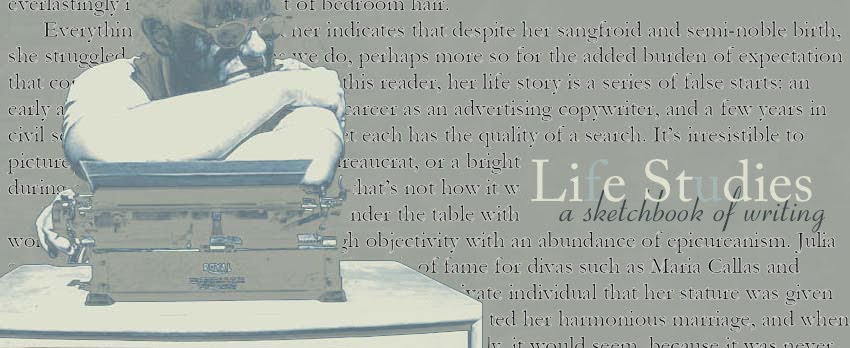In the one, there is no trace of him, as the linoleum tiles must have been pulled up and discarded, or scrubbed until colorless and bald.
In the other, his boyhood portraits—one on each side of the blotter—overpower the desk. On the piano, his face begins already to be sad, the strange bloating of his last two years apparent. His wartime snapshots, and those of the uncertain civilian years that followed, look like frames from Hud.
Then quite suddenly, he made 33 look like 50.
I have his suede windbreaker with the leather buttons. I have his slide ruler in its rigid kid leather case with FOGLE in big block letters down the side. I have every driver's license and vehicle registration he was issued between 1946 and 1952 and his Pennsylvania Railroad passes in bright construction-paper colors. I have his christening jacket and cap and tiny cotton socks the color of tapioca pudding.
But most of all I have his drawings, the caricatures of a too-privileged childhood on Philadelphia's Main Line. One group is a tablet of faces labeled "Village Hen," "Writer," "Hick," "Queer," "Genius," and "Young Jew." Everything is extrapolated, objectified, the traits made lurid in the funhouse mirrors of his observant, articulate isolation.
All through elementary school I remember the word, in the warm navy-blue ovals of my mother's penmanship, on the line designated for Father: deceased. "Heart attack," she would say, checking on a pot roast or dead-heading some petunias.
But my grandmother would close her eyes, then open them, her voice full of a sad honey: "Your father died of a broken heart."
Once when I was 35 and visiting her for the weekend, my mother and I went up to Ridge Pike to buy some flowers for her patio. I missed the parking lot for the garden center and had to turn around near a church. "Your father and I were married here."
Such disclosures came throughout my life as the bricks of an old foundation work their way up to the topsoil of a flowerbed.
When I was 10 we were cleaning out our storage area in the basement of our apartment complex and I found a small, black, musty three-ring binder. The tiny pages inside were filled with a clear, bold handwriting that recorded, with a strange candor, household life. The only line I remember from it is Marion may be pregnant again.
I handed it to my mother and she flipped its pages, balling some of them up with her fist. After a few minutes she handed it back to me.
I gave it to my grandmother.
I never saw it again.
* * *
Knowing my mother as I do, now and then I subtract her robust traits from my personality and reflect upon the ghostly remainder of the equation. They form a fragile etching, these genetic touches from another person, entirely unknown to me yet so present during my childhood in my grandmother's house—the shoebox of pictures, the dark closet of sports coats, neckties, and shoes.
I admit I feel a kinship with his rapid, confident pencil lines—that blind impulse to express.
A proliferation, a superfluity of nerve endings just at the surface of his consciousness amassing a toolkit of mouths and chins and noses and knees upon which—from which—he drew.
A thousand painful, spiteful, delightful impressions.

